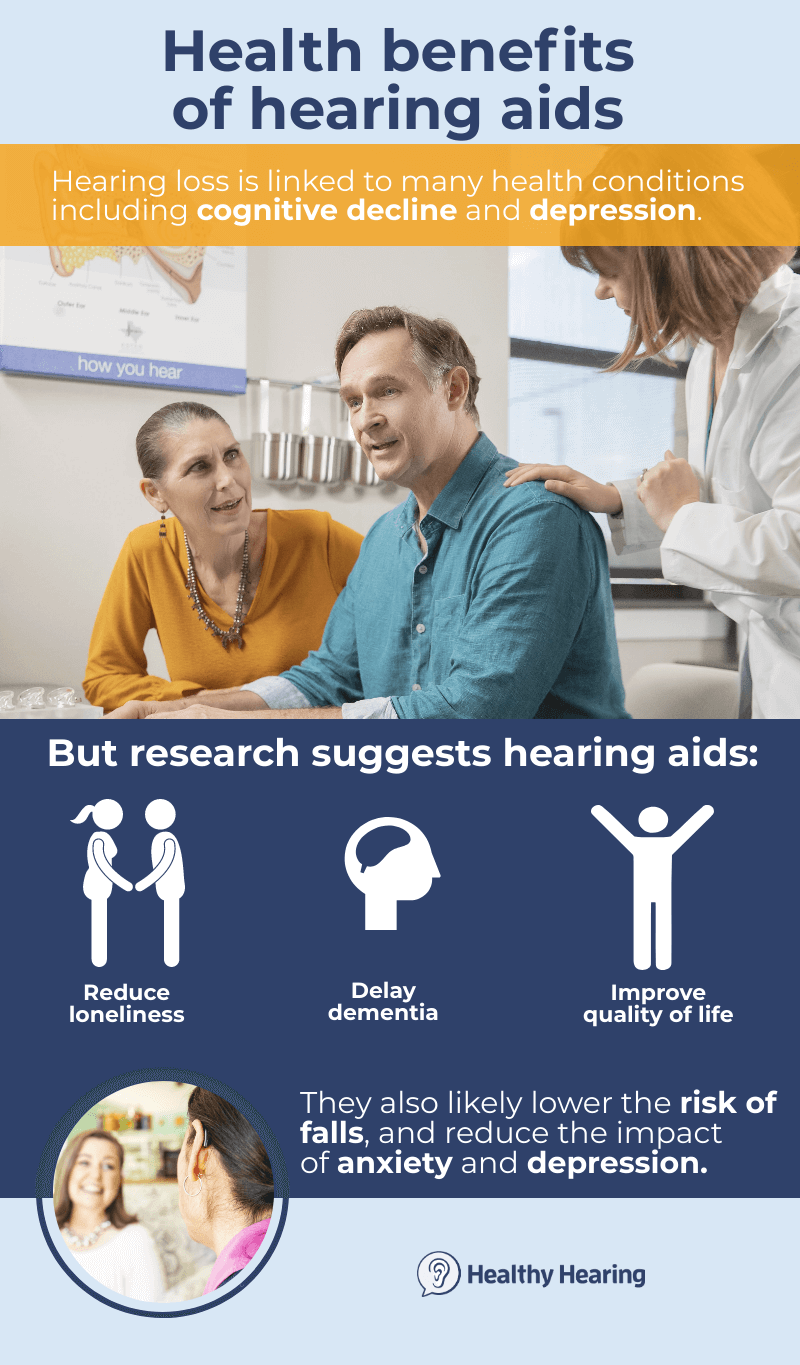- Subtotal:
🦻Health benefits of hearing aids

Increasingly, research is showing that hearing aids can do far more than just help you hear. They may also make you healthier. Here's why.
It's well known that untreated hearing loss is linked to several health dangers, including higher rates of dementia, falling and depression. Experts think a lot of this stems from the social isolation caused by hearing loss.
"People begin to withdraw from activities that would put them in touch with others and that can lead to loneliness and depression." explained Harvey Abrams, PhD, a longtime audiologist on the graduate faculty at the University of South Florida in Tampa who studies the effect of hearing aids on overall quality of life.
This isn't a rare problem: Hearing steadily declines as we age. By 100, nearly everyone has hearing loss.
The good news? More than a decade ago, research revealed that treating hearing loss via hearing aids or other devices like cochlear implants an improve overall quality of life. Since then, a wealth of research has shown similar benefits. Let's take a look:

Hearing aids linked to overall better health
In 2020, a team from three U.S. insurers, reporting on a survey of more than 20,000 older adults, observed that people with severe hearing loss who didn't wear hearing aids were more likely to say they were in poor health and were less likely to leave home or exercise regularly. This was not true of people who wore hearing aids—even if their loss was severe. People who wore hearing aids were also less likely to report depression.
A breakthrough study in 2019 analyzed what happens in the three years after you get your first hearing aid. It found that among people with newly-diagnosed hearing loss, getting hearing aids cut the risk of developing dementia by 18 percentage points, the risk of a fall-related injury by 13 percentage points and the risk of developing anxiety or depression by 11 percentage points.
To reach this conclusion, a large team of researchers led by Elham Mahmoudi, a health economist at the University of Michigan, pulled five years of claims data nationwide from a managed care provider, finding nearly 115,000 seniors who met their criteria—a new diagnosis of hearing loss and no history within the previous year of the medical issues under study. The team also looked for other conditions associated with hearing loss like diabetes, obesity and heart problems and adjusted their calculations to make this sample typical. The next step was to analyze the sample’s history for the next three years.
The study confirmed earlier evidence that people with hearing loss are more likely to develop dementia—in this sample, 13.9% did, compared to about 12% in the general population age 66 and up. Also, nearly 13% of the sample had an injury in a fall (compared to 7.5%) and 33.6% were depressed (compared to 25.2%).
Only a randomized trial can show cause-and-effect, so this study isn’t conclusive that hearing aids protected their users, though it seems likely.
Hearing loss and cognitive decline
It also doesn’t mean hearing aids solved an underlying issue. Instead, hearing better probably bought time, delaying onset of symptoms. Left untreated, hearing loss may be a sign that dementia, for example, could come about two years earlier, according to research on hearing loss and cognitive decline.
Scientists suspect a classic feedback loop: Cognitive decline makes it harder to understand what you hear, and hearing loss puts a burden on your cognitive resources, leading to changes in your brain. Isolation, loneliness and depression feed into this loop as well. Loneliness increases your risk of dementia by as much as 40%, and may even be a symptom of early brain changes, as suggested by a small brain scan study.
Catching hearing loss early may be important. If you can hear a sound of 25 decibels—about the loudness of a whisper—you are considered to have normal hearing. But even slight hearing loss could be linked to cognitive decline, according to 2019 research from a team based at Columbia University. In fact, the team found a significant link to cognitive decline for every 10 decibels of loss and most dramatically in those who were just 10 decibels short of perfect hearing.
Middle age may be the turning point. In another 2019 study of more than 16,000 Koreans newly diagnosed with hearing loss over a decade, hearing loss emerged as a significant risk factor for dementia most strongly in people ages 45 to 64.
Don’t feel doomed! You’re not guaranteed to develop dementia because you haven’t checked your hearing or leave your hearing aids in that cute little box.
But keep in mind recent large studies show that wearing hearing aids is one of the things you can do relatively easily to lower your risk of developing dementia. The same seems to be true for cochlear implants and cognition.
More: Understanding auditory deprivation: Why untreated hearing loss is bad for your brain
Hearing loss affects mental health
The effect on your social life and mood may creep up on you, especially if you can’t understand speech in a noisy environment. In people under 70, every decibel drop in this kind of perception raises the risk of being severely lonely, a Dutch study found. Not wearing hearing aids is a risk factor for loneliness in other research. And there is a bit of evidence that getting a hearing aid or cochlear implant can prevent loneliness from deepening over time. The key is how you feel. One person might not socialize often but feel rich in friendship and another look popular to observers but feel lonely. Either way, hearing loss can affect how other people perceive you, as Abrams observed.
Loneliness too easily cascades into depression. In a 2019 overview of 35 studies covering more than 147,000 older adults, hearing loss increased the odds of depression by 47% (it wasn’t clear in this overview that hearing aids helped). Suicidal thinking, most often a symptom of depression, is linked to hearing loss as well. Hearing loss may also exacerbate or contribute to schizophrenia and other psychoses late in life.
Less psychological distress among hearing aid wearers
In data from more than 25,600 U.S. adults, people with hearing loss were more likely to say they use antidepressants and antianxiety medication as well as mental health services. Hearing aids helped: Among those who had moderate hearing loss, more than 77 percent reported psycholgical distress, compared to 23 percent of those with hearing aids.
The link between hearing loss and falls
Both hearing loss and depression are associated with a higher chance of a fall, a growing problem among the elderly, and falls tend to deepen depression and increase the risk of death.
A 25-decibel hearing loss, equivalent to going from normal to mild hearing loss, may triple your chance of falling, according to a study of people in the middle years—from 40 to 69—when hearing loss often first develops and you’re less likely to guard against falls.
Unfortunately, research has not supported the idea that people with balance issues are more stable when wearing hearing aids.
More on hearing loss and falls.
The link between hearing loss and cardiovascular disease
Age-related hearing loss is usually in the higher frequencies. But Abrams recalls that during his years in a Veterans Administration hospital, he saw men with gradual loss in their low-frequency hearing. It turns out that low-frequency hearing loss may be a marker of a greater chance of stroke, peripheral vascular disease and heart attack.
A 2020 analysis of data of more than 1,300 African Americans found that participants with poorer scores on a combined measure of heart risk factors had more hearing loss. Healthy weight, physical activity, good blood pressure and fasting glucose were each linked to better hearing. Research in Iceland also linked untreated hearing loss in men to a greater chance of dying in the next five years, most often from heart disease.
Interestingly, hearing aids are associated with better heart health. In a 10-year study of nearly 4,000 British men age 63 to 85 who were living in the community, men with untreated hearing loss were more than a third more likely to have a stroke or heart attack and to die of a cardiovascular event than men without hearing issues, but wearing a hearing aid lowered their risk. It's not clear why hearing aids were linked to a lower heart disease risk, though it may indicate that these men are taking better care of their health overall.
Ready to get help?
Bottom line: If you have hearing loss, the evidence so far indicates that getting hearing aids can improve your health in many ways, beyond helping you hear better.
